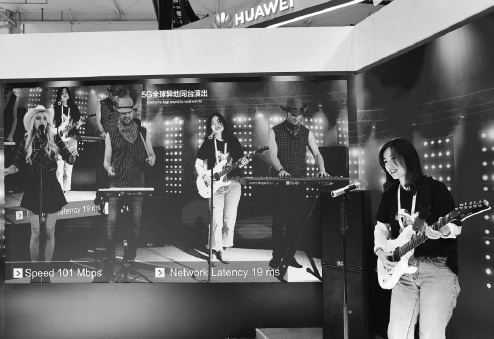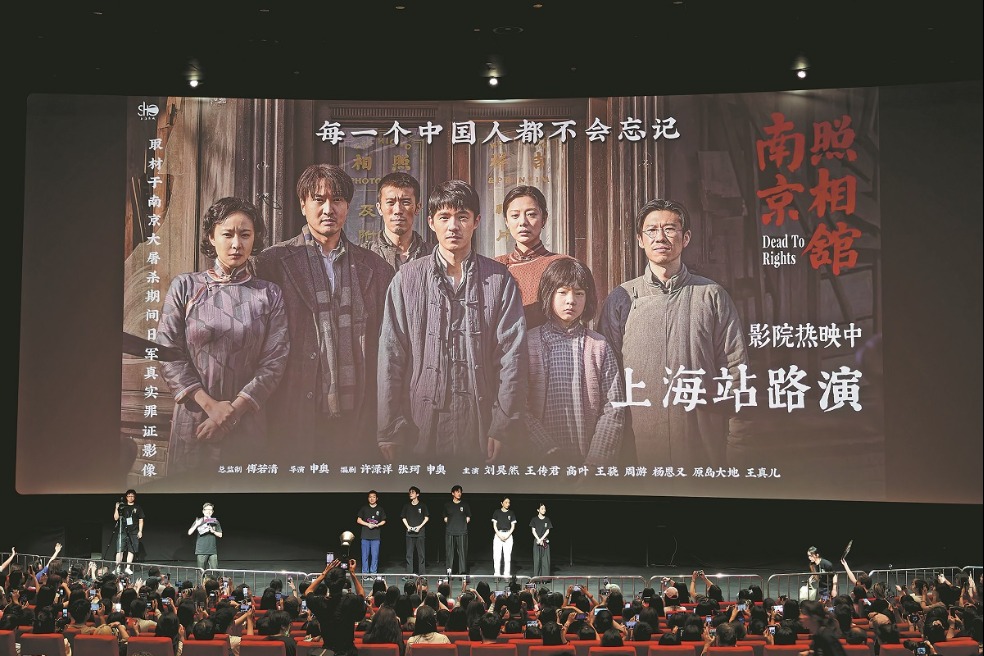Youth power fuels online music growth
Firms ramping up efforts to sell services via paid memberships, virtual performances on digital platforms

Zhao Xiaohan, a 20-year-old sophomore at Beijing Foreign Studies University, recently purchased two music platform memberships. The yearly subscription fee of 276 yuan ($42) allows Zhao to enjoy abundant music resources at QQ Music and NetEase Cloud Music-two major music streaming service providers.
"It just costs me 23 yuan on average per month, and I can listen to many Mandarin, Cantonese and English songs from my favorite singers such as Mayday, Jay Chou, Stefanie Sun and Eason Chan," said Zhao, adding that she usually spends about an hour on the platforms each day.
Zhao said people around her are also willing to pay for memberships. Moreover, as a music enthusiast, last month she watched a livestreamed concert from Singaporean Mandopop singer Stefanie Sun on TME Live, a live performance brand under Tencent Music Entertainment Group.
"I planned to see her offline concerts this year, which mark the 20th anniversary of her debut. The online livestreamed performance is also a good choice as lots of offline performances have been canceled due to the COVID-19 pandemic," she added.
Major Chinese online music platforms have ramped up efforts to sell services with paid memberships and offer online live performances during the pandemic period.
NetEase Cloud Music, an online music streaming service owned by Chinese internet company NetEase Inc, has launched several online livestreamed music concerts in an attempt to help musicians and the performing market overcome difficulties.
Yang Zhaoxuan, chief financial officer of NetEase, said they continued to see triple-digit revenue growth on a yearly basis for NetEase Cloud Music in the second quarter, with both membership and livestreaming striking new highs and securing a multiyear licensing agreement with Universal Music Group.
"We are very committed to bringing rich content to Chinese users by introducing exciting global music and incubating independent musicians," Yang said, adding that the company rolled out numerous paid live shows for independent bands, giving them more options to stream online during this period.
For instance, marking their seventh anniversary, Chinese boy band TFBoys held an online paid concert on NetEase Cloud Music in August, attracting nearly 800,000 viewers online.
NetEase Cloud Music said the offline performance sites such as arenas and stadiums were shut down due to the pandemic. "We are willing to take the initiative to cover the expenses at venues and for photography along with visual and livestreaming teams for online performances," Yang added.
Launched in 2013, NetEase Cloud Music has grown to become one of the most popular music streaming platforms in China with 160,000 independent musicians.
As the contagion increasingly comes under control in China, the combination of offline and online paid performances will be a healthy and reasonable business model during the post-pandemic era, it noted.
With the rise of Generation Z, young people are increasingly willing to pay for copyrighted music, and the post-1995 generation exhibits less objection to paying for digital music subscriptions.
In addition, with the arrival of the 5G era, music consumption scenarios for users will be more diversified as memberships, paid albums, songs and livestreaming are becoming the main forms of payment, the company said. Meanwhile, the emergence of new models such as online performances will promote the development of the paid-for music segment.
According to Statista, a German online data portal, China is a fertile market with about 750 million digital music users as of 2019. And the total is expected to rise by another 50 million in 2023.
"Compared with digital album consumption, users who buy exclusive membership services should be the main force for bolstering the music payment industry," said Chen Xianjiang, founder of ReChord, a music information portal, adding that the proportion of users who are likely to purchase a monthly or yearly membership is rising.
Chen added that it won't be easy to continuously increase music payments, which require online platforms to own enough high-quality copyrights. "The copyright war between major platforms in previous years was to retain users."
These platforms should do more to cultivate and promote original music, expand business scope in podcasts and audio books and amplify product lineups, Chen said.
Tencent Music Entertainment Group, a major online music entertainment platform in China, said paying users for its online music services grew 46 percent year-on-year to 51.7 million in the third quarter of this year. The paying ratio was 8.0 percent, up from 7.2 percent in the second quarter.
Its online music subscription revenue from July to September reached 1.46 billion yuan, an increase of 55 percent on a yearly basis.
Cussion Pang, chief executive officer of Tencent Music, said the company has made tremendous efforts to advocate the pay-for-streaming model, cultivate indie musicians as well as promote digital albums and online concerts via TME Live.
"Expansion of our music library and diversification of our content offerings continued, with more video and long-form audio now available. We have enriched online music streaming by adding visual, interactive and social attributes to our products, including offering a whole new level of online concert experiences through TME Live," Pang said.
TME Live has organized nearly 40 live concerts for well-known artists during the COVID-19 outbreak, and designed various services such as VIP package and virtual gifting for users to engage with artists.
The company has also signed licensing deals with world-renowned music labels such as Sony Music Entertainment, Universal Music Group and Warner Music Group to drive the growth of digital music commercialization in China.
TME has been playing a key role of promoting and legalizing the digital music market of China, and now operates the country's popular and innovative music apps, including QQ Music, Kugou Music, Kuwo Music and WeSing, according to the company.
Cai Xukun, one of the winners of the iQiyi reality show Idol Producer, released his digital album Young on TME's music platforms last year, with sales exceeding 60 million yuan.
According to statistics from market research company iResearch, the revenue of China's digital music market is estimated to hit 13.55 billion yuan in 2020, up 30.5 percent on a yearly basis. This figure is expected to reach 42.57 billion yuan by 2023.
The consultancy said that the revenue is mainly from user payments, advertising and copyright operations. In particular, paid subscriptions for online music streaming are expanding.
China's online music market is booming along with the authority's relentless efforts to combat piracy and protect intellectual property rights in recent years, said Yu Yandi, an analyst at Beijing-based internet consultancy Analysys.
Yu said more Chinese netizens are willing to pay for music content as expenditures for digital songs or albums are much less than purchasing physical records in the past. "The young generation can afford the expenses and some of them even buy annual memberships."
The pandemic has boosted livestreaming performances, which are not limited by time and space, and the cost of watching a paid online concert is much cheaper than offline equivalents, Yu said, adding that music fans can also communicate with their idols through bullet screen, which refers to real-time comments from viewers that fly across the screen while a video is playing.
"Online music streaming service providers should make some innovations in stage design, and make full use of cutting-edge technologies, such as 3D, virtual reality and superfast 5G, to enhance the quality of online livestreaming performances," Yu added.


Today's Top News
- Japan must face up to its wartime past
- Vision turns county into green model
- China rolls out new visa type for young science talent
- Cambodia, Thailand urged to engage in dialogue, rebuild trust
- China stays at forefront of global digital growth
- Beautiful China vision has sown the seeds for the blossoming of an ecological civilization: China Daily editorial






























